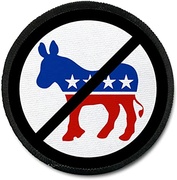CovOps

 Location : Ether-Sphere Location : Ether-Sphere
Job/hobbies : Irrationality Exterminator
Humor : Über Serious
 |  Subject: PERPETUALLY HOWLING DOGS OF THE IRRATIONAL LEFT: How Supreme Court 'Radicalism' Could Threaten Democracy Itself Subject: PERPETUALLY HOWLING DOGS OF THE IRRATIONAL LEFT: How Supreme Court 'Radicalism' Could Threaten Democracy Itself  Wed Mar 09, 2022 2:29 am Wed Mar 09, 2022 2:29 am | |
| In the last six years, confidence in our fragile election system in the United States has been battered by a flood of election misinformation and disinformation spread on social media, cable television stations, podcasts, and videos. Headed into the 2022 elections, now is the time for Congress and states to pass meaningful reforms to shore up that confidence and help preserve American democracy. Although partisan gridlock and fights over the fairness of the 2020 election already make new legislation a longshot, the biggest impediment may well be a supermajority of conservative justices on the Supreme Court, whose part-time libertarian views of the First Amendment could doom meaningful reform.

As I argue in my new book, Cheap Speech, false claims about the fairness and integrity of the American election system pose a huge risk for American democracy. As millions of Trump supporters continue to believe the false claims that the 2020 election was stolen, and as false and incendiary election-related speech flows anonymously and virally across portions of social media, public confidence in the fairness of our election system has crumbled among Republicans. With purveyors of the Big Lie poised to take over the running of elections in some places before the 2024 elections, we can expect confidence on the left to take a similar beating. A democracy cannot function without fair elections and when losers do not accept election results as legitimate.
Although law is only part of the answer to how to deal with this crisis in election legitimacy, it is an important piece. Congress or states could do much to assure that voters have good access to fair and truthful information to make decisions about how to vote consistent with their values and interests, and so that they can have confidence that elections are being conducted fairly and results reported accurately. And this can be done while maintaining a strong commitment to robust speech protections during campaigns.
Some of the laws I propose in Cheap Speech could likely pass constitutional muster, such as a ban on false election speech about when, where, and how people are meant to cast their votes. These laws protect the public’s compelling interest in assuring voters can meaningfully exercise the franchise. Already the federal government is prosecuting a Trump supporter for social media posts targeted at Black voters falsely telling people they could vote for president by text. The Supreme Court wrote in a 2018 case, Minnesota Voters Alliance v. Mansky, that “We do not doubt that the State may prohibit messages intended to mislead voters about voting requirements and procedures.”
Many necessary laws to support election integrity, however, would be at risk of being held unconstitutional by a Supreme Court that often adopts a naïve libertarian “marketplace of ideas” approach to the First Amendment that presumes without evidence that the truth will rise to the top.
For example, our current laws requiring disclosure of funding of large-scale campaign activity are woefully inadequate. Today, if someone runs a television ad supporting a candidate for president or Congress coming through on a cable television box or DirecTV satellite feed, federal law requires disclosure of the ad’s funders. But if that same ad comes through Hulu or YouTube TV or appears via Facebook, the ad is not covered unless it explicitly calls for a vote for or against a candidate because our laws have not been updated to deal with technological change.
For many years, even many conservatives on the Supreme Court such as the late Justice Antonin Scalia recognized the value of campaign finance disclosure in not only ferreting out corruption but also insuring that busy voters have useful information to judge election-related messages they receive. Scalia famously wrote in a 2010 case that a system in which people can hide their identities while engaging in political activity “does not resemble the Home of the Brave.”
I am sure that moderate Alabama Republicans targeted with Facebook messages from what appeared to be a group of Baptist teetotalers purporting to support a ban on alcohol and back Republican candidate Roy Moore would have viewed the credibility of such messages differently if they knew that the ads actually were the product of a left-leaning independent group that was trying to elect Democrat Doug Jones to office during the 2017 special U.S. Senate election to replace Jeff Sessions.
But the court has begun backing away from approval of disclosure laws, moving closer to Justice Clarence Thomas’s position that there is a constitutional right to spend big money on elections anonymously. In Justice Thomas’s world, big spenders can hide their identities to contribute or spend unlimited sums on elections, opening up not only paths to corrupt candidates but depriving voters of valuable information. In last year’s Americans for Prosperity Foundation v. Bonta, the court signaled it was going to apply much closer scrutiny to disclosure laws than it has in the past, making it ever harder to find out who is trying to influence voters and why.
If the court meaningfully goes after disclosure laws, that could doom more than just laws requiring funders of big campaign ads to reveal themselves. It also could undermine laws that help us determine when foreign governments or other foreign entities are trying to influence our elections and confidence in our election process. And it could prevent Congress and states from passing laws that would mandate that social media companies label “deep fake” videos and audios as “altered.” Tricksters could use artificial intelligence technology to create realistic false images or sounds showing a candidate saying or doing something they did not really say or do, such as uttering a racial slur, being found in a sexually compromised position, or having a medical emergency. Requiring the labeling of such videos as altered could help voters make sense of what they see and hear, but Supreme Court doctrine on disclosure and “compelled speech” could render such laws unconstitutional.
It would be bad enough if the Supreme Court simply applied outmoded libertarian thinking to today’s information cesspool, believing that the truth will inevitably rise to the top and give voters the tools they need for informed decisionmaking. But the court’s inconsistent thinking on the First Amendment could make things far worse.
Consider the decision of Facebook and Twitter to “deplatform” Trump after he helped inspire the violent insurrection at the U.S. Capitol on January 6, 2021. Meta, which owns Facebook, and Twitter are private companies that make decisions all the time about what content to include, exclude, promote, and demote. The First Amendment does not limit these private companies and they can regulate speech in ways the government could not do. These companies remove hate speech, pornography, and other objectionable content from their platforms all the time.
But Justice Clarence Thomas—yes, the same Justice Thomas who believes that virtually all campaign finance laws violate the First Amendment—recently went out of his way in a case not presenting the issue to raise support for new laws, such as one passed last year in Florida, that would require social media companies to carry the content of politicians they do not like, even if those politicians support election violence or undermine voter confidence in the integrity of the electoral process. Justice Thomas has suggested that social media platforms are like telephone companies that could be subject to “must carry” provisions and cannot discriminate among customers based upon their political views.
But social media companies are much closer to newspapers and TV stations than telephone companies. The former but not the latter curate content all the time, and they can decide who appears on the platform and how. Justice Thomas appears to believe in the freedom of FOX News or the Atlantic to create a coherent brand with a message, but not Twitter or Facebook.
It is hard not to conclude that Justice Thomas was motivated toward this anti-libertarian position requiring private companies to carry speech they would rather not include on their websites because doing so would favor Donald Trump and those like Trump.
And perhaps that affinity for Donald Trump and his ideas explains why Justice Thomas and Justice Neil Gorsuch have expressed a willingness to rethink the Supreme Court’s key holding in the 1964 case of New York Times v. Sullivan, a case which launched a line of First Amendment decisions making it very difficult for public officials and public figures to sue for defamation. The “actual malice” standard set forth in the case—which requires a defamation plaintiff to prove that a journalist or other speaker made a statement with knowledge of its falsity or with reckless disregard as to its truthfulness—has protected journalists and assured that the public can get the information it needs to evaluate candidates for office and others involved in the political process.
These conservative Justices, echoing Trump’s calls to “open up” the libel laws, would chill legitimate journalistic investigations into candidates. This is the opposite of a libertarian faith in the marketplace of ideas. Making it easier to sue for defamation would not be a prime guard against disinformation, as Justice Gorsuch incorrectly suggested in a 2021 statement in Berisha v. Lawson. Although it is true that voting machine company defamation lawsuits against some right-wing cable news outlets probably deterred some false election speech, defamation lawsuits won’t help control that much disinformation because much disinformation comes from anonymous sources or does not injure anyone’s reputation in a way that would allow a defamation suit. And the costs of the chill would be way too high.
In the end, we may find that when it comes to efforts to shore up the legitimacy of our election system and provide voters with the information they need to make informed election decisions, the Supreme Court may become as much of an impediment to reform efforts as it has on voting rights, partisan gerrymandering, and campaign finance reform. More and more the court is looking like no friend of democracy and just another partisan actor.
.https://slate.com/news-and-politics/2022/03/supreme-court-radicalism-threatens-democracy.html
  |
|

